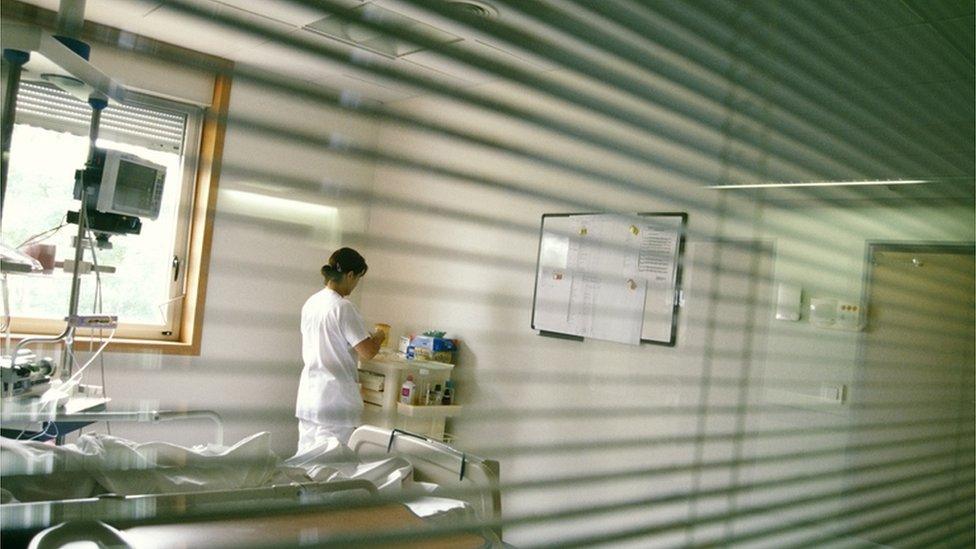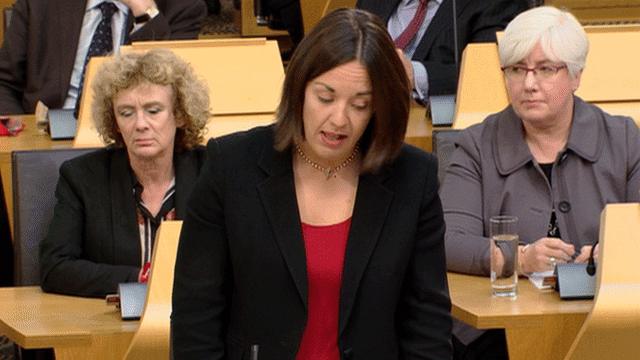FMQs and a row over bed blocking statistics
- Published

Perhaps it was the weather, warm but decidedly windy. Perhaps they had seen the menu in the Parliamentary canteen and didn't fancy the soup. Perhaps their team had been knocked out of the League Cup - unlike the (once more) mighty United.
Who knows? But there did seem to be a faintly tetchy edge to the exchanges involving our political leaders at Holyrood today.
Only faintly, though. Wouldn't do to exaggerate. But Nicola Sturgeon, for one, seemed mildly exasperated at the nature of the inquisition to which she was subjected by her three principal opponents.
Pressed for stats on health care by Labour's Kezia Dugdale, she dished up a substantial repast then offered to put things a different way "if that would be easier" for her opponent to understand. She sounded like a maths teacher infuriated by the stubborn failure of youth to absorb the glories of trigonometry.
Later, she traded insults over GM crops with Ruth Davidson of the Tories and suggested, volubly, to Willie Rennie of the Liberal Democrats that he might usefully offer some ideas on GP provision "rather than just carping from the sidelines."
Indeed, the FM's mild irritation only subsided when she was given a very brief opportunity to praise Scotland's magnificent effort in the Rugby World Cup.


Mind you, that was a tiny mention en passant at the outset of a discourse about concussion associated with contact sports, as examined in the excellent documentary by my esteemed colleague John Beattie. So the lightness of the moment was swiftly subsumed in deeply serious exchanges.
If the FM was a tiny bit grumpy, then she was matched in mood by her opponents. Kezia Dugdale opened by noting that Audit Scotland had delivered a "withering assessment" of the Scottish justice system, particularly with regard to the operation of our courts.
So withering in fact that she swiftly changed tack to ask instead about delayed discharge from hospitals. I get the concept. Ms Dugdale was seeking to construct a narrative of poor performance by Ms Sturgeon's government: on health, on justice, on education (she harked back to that issue as well.)
Not sure it really worked on the day, though. It sounded to some extent as if she couldn't make her mind up - or, perhaps, she was merely keen to reflect the range of issues raised in her postbag, like her Westminster colleague.
Ms Dugdale's predecessors occasionally whispered privately that they felt the structure of FMQs actually gave them too many opportunities to pursue the incumbent. Too many questions, if confined to a single topic.
Perhaps Ms Dugdale is seeking to get round that problem. She suggested initially that Audit Scotland were not comparing spending like for like on court funding, that they had neglected to reflect the impact of a change in capital spending which had been boosted some years back by a particularly large project at Parliament House.
Ms Dugdale began by arguing that Audit Scotland did the numbers, while the FM did the spin. But then she dropped that topic and moved on to the NHS.
Which gave the FM her opportunity. She instantly suggested that Ms Dugdale lacked any come-back on the courts question - before proceeding to answer both topics.
There followed a stats war on the topic of delayed discharge. More people affected, sniped Ms Dugdale. Fewer days delayed, countered Ms Sturgeon.
"You run for cover when you fail to deliver", feinted Ms Dugdale. The parry?"You can't even get to grips with the art of opposition which suggests there is not much chance of getting into government." Told you they were grumpy.

UPDATE
PS, and there's more, rather a lot more.
During the exchanges over delayed discharges from hospital, Labour's Dr Richard Simpson could be heard growling from a sedentary position. Now we know why.
The said Simpson - who is a doctor of medicine, rather than philosophy, letters or law - took great exception to remarks made by the First Minister. And said so in a subsequent Point of Order to the chair.
The substance is this. In the middle of a flood of stats, Ms Sturgeon said: "Having delivered the target of zero delays over six weeks, we have progressively toughened that target."
A delay of that duration, for the avoidance of doubt, involves a patient being kept in hospital for at least six weeks longer than clinically necessary, generally because no alternative care is available.
Dr Simpson said he had checked with parliament's own information centre. Based on that research, allied to his own knowledge, he believed the First Minister's remarks were misleading.
According to Labour, Scotland's patients had not enjoyed "zero delays over six weeks" for three years. That is, there had been patients during that three-year period who had stayed more than six weeks in hospital beyond potential discharge.
The immediate response from the First Minister's office is that the target - of zero delays over six weeks - had been met in the past. The general tenor of her remarks was that matters were improving - while there remained more to be done.
Dr Simpson has now, in effect, suggested that Ms Sturgeon might reconsider that stance.

PPS: More still. The Scottish government has now issued a statement to the effect that the six-week target had been met at sundry points in the past. For ease of info, herewith that statement in full, from a Scottish government spokesman.
"The first minister was correct that the old six-week target was met, on a number of occasions, under this government.
"Subsequently, the Scottish government introduced new tougher targets that no patient should wait more than four weeks, and later two weeks, from when they are clinically ready for discharge.
"Working with our partners in local government we've made the level of performance we expect tougher still, with an ambition for patients to be delayed for no more than 72 hours.
"These targets have been progressively toughened to drive change, and while performance can fluctuate, health boards and local authority partnerships have reduced waits over six weeks by 75% in the last decade, with delays over 72 hours being halved over that same period.
"Through our £100m, three-year delayed discharge fund we are working closely with those areas that are experiencing challenges to bring down rates even further."